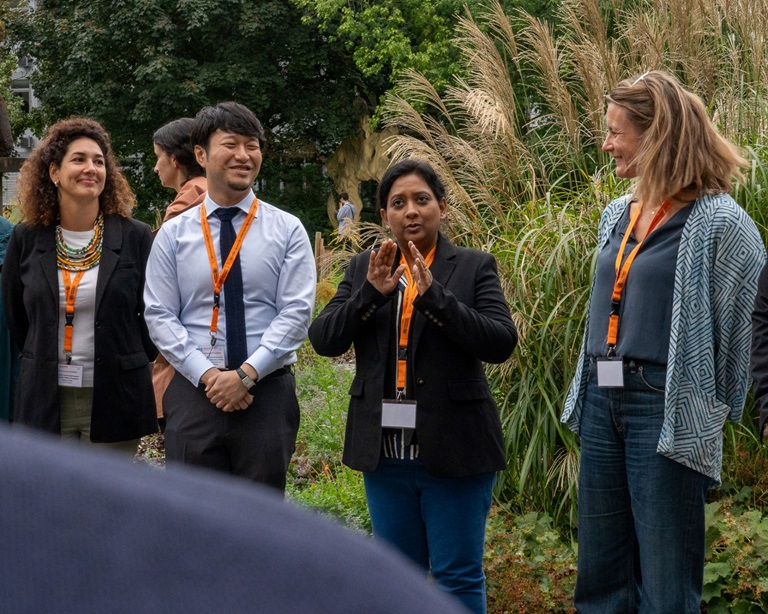Public health experts from the Western Pacific Region who are part of the Global Outbreak Alert and Response Network (GOARN) benefited from the first leadership training organized by the World Health Organization (WHO) − in collaboration with the Robert Koch Institute and the Geneva Centre for Security Policy − in September 2023 in Berlin, Germany. The training supported a common standard and baseline of knowledge across all GOARN partners, which serves to facilitate a more seamless integration with government, national and international partners in their response teams.
According to training participant Dr Peta-Anne Zimmerman, a seasoned GOARN focal point for the Australasian College for Infection Prevention and Control, the training solidified her understanding of her leadership style, and enabled her to preempt pitfalls when leading teams and to leverage her personal strengths. “My leadership style is collaborative, so understanding that this is how I lead others has helped me use this style more purposefully to work through tough situations in the field,” she said. Dr Zimmerman used this insight during a Joint External Evaluation in Samoa that took place from 30 October to 23 November 2023, where she was able to work collaboratively with the Ministry of Health to identify areas for improvement in health security preparedness capacities.
Dr Yukimasa Matsuzawa, Deputy Director at the National Centre for Global Health and Medicine in Japan, who also participated in the training, appreciated how beneficial it was to his work. “When we try innovative ways of doing things, it requires a bit of risk taking. I built confidence in my ability to take calculated risks to bring elements of innovation to our work. The GOARN leadership training enabled me to discover and leverage my personal influencer-style of leadership to create alignment among partners,” he said.
The GOARN Outbreak Response Leadership Training programme is designed to build the leadership and crisis management skills of highly experienced outbreak responders to act as influential and trusted leaders during public health emergencies. As a result of this training, GOARN responders are able to apply leadership and crisis management skills to any kind of public health emergency response and structure. During the training, participants shared their personal experiences challenges and concerns, and reflected on insights from responding to the COVID-19 pandemic and recent disease outbreaks. They reflected on themes such as: how to create inclusive leadership, how to span boundaries and how to establish trusted relationships with key stakeholders to influence collective decision-making.

GOARN training participants engage in a discussion. Photo credit: Tim Stark
Harnessing collective expertise to advance better preparedness in the Region
Another significant positive outcome of the training is the network that it generates. “If we communicate during times of peace, then we are better prepared for times when there are emergencies, and we need to collaborate extensively,” said Dr Matsuzawa.
Using the skills and knowledge gained at the recent leadership training, Dr Zimmerman uses opportunities to build capacity for other GOARN members. She recently invited GOARN members from the Pacific to shadow her as she facilitated a GOARN training in Australia, so that they were better prepared to deliver their own country-level training. GOARN members also invite each other to attend partnership meetings, to learn from each other’s strategies and work through shared challenges. Elaborating on the benefits of the network, Dr Zimmerman said, “as an infection prevention and control expert, I have benefited immensely from how field epidemiologists work during an outbreak, and vice versa. GOARN facilitates this sort of cross-pollination of ideas and that is the beauty of the network.”
Moving forward, GOARN will scale up the delivery of the outbreak response leadership training. Leadership training is important to build up a cadre of high-level outbreak responders that are interconnected to ensure rapid detection and outbreak response.
GOARN was formed in recognition of the need to strengthen and coordinate the rapid mobilization of experts responding to international outbreaks. The organization comprises over 300 technical institutions and networks globally, including 76 partners in the Western Pacific Region. Since 2003, GOARN has responded to several outbreaks in the Region including severe acute respiratory syndrome, A/H5N1, meningitis, cholera, leptospirosis, vibrio vulcanificus, polio, dengue, acinetobacter baumannii, measles, Zika virus and COVID-19. During the COVID-19 pandemic, 72 GOARN experts contributed to 89 missions to support countries in the Western Pacific Region.




